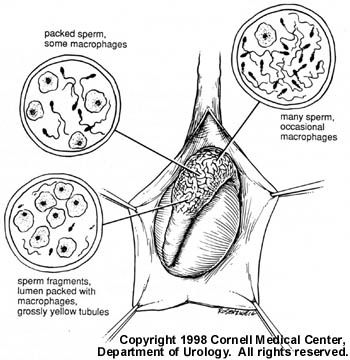The effect of chronic reproductive tract obstruction on the location and quality of spermatozoa must be appreciated prior to any attempts at sperm retrieval. The site of sperm retrieval affects sperm quality, and the quality of retrieved sperm in turn may affect the chances for successful fertilization and cryopreservation of retrieved sperm.

Figure 1
It has long been thought that sperm exiting the testis lack maturity, motility, and fertilizing capability and that transit through the epididymis is essential to the acquisition of these features. Several investigators, however, have shown that although in the unobstructed setting sperm quality improves as the spermatozoa travel from caput (head) to cauda (tail) epididymis, this is not true in the obstructed situation. In reproductive tract obstruction, improved motility is seen in sperm retrieved from the caput epididymis compared to the cauda. Sperm aspirated from the efferent ducts and caput epididymis can be morphologically similar to sperm from normospermic men except for the presence of cytoplasmic droplets. In contrast, sperm from the tail of an obstructed epididymis are in advanced stages of degeneration and necrosis. Normal sperm are absent or rare, whereas macrophages filled with phagocytized sperm remnants are seen in abundance. In the presence of reproductive tract obstruction, continual sperm production by the testis occurs and ongoing resorption of dead and degenerated sperm in the distal epididymis is found. This finding, referred to by some as "inverted motility", is illustrated in Figure 1.
Thus, although it has long been thought that sperm exiting the testis are immature and incapable of fertilization, this holds true only in the unobstructed system. Therefore, in obstruction, better quality sperm can be found proximally in the efferent ducts or caput epididymis, and the distal epididymis is the site of sperm degeneration. These factors should be taken into account during any attempt at sperm retrieval.

